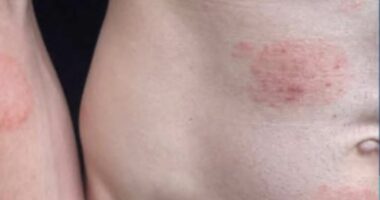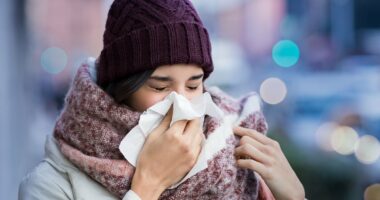Share this @internewscast.com
Brits travelling to a number of popular holiday destinations this summer have been urged to apply one thing after sunscreen. This step could help protect them from dengue fever amid an updated warning about the illness.
Dengue fever, which is also known as breakbone fever, can be mild but in some cases can lead to extreme symptoms and even death.
Dengue is typically only found in tropical climates but experts warned it has the potential to spread to other areas of the world as our climate changes.
Travel Health Pro warned that some tourist hotspots have recently seen “sporadic” cases of dengue fever.
And the National Travel Health Network and Centre and UK Health Security Agency has reviewed its the country-specific guidance for countries with a risk of dengue.
Scattered local cases of dengue have been reported in: Australia, Croatia, France, Italy, Maderia, Spain, United Arab Emirates and USA. However, visitors are not required to get a vaccine prior to travelling to these locations.
While vaccines are not considered necessary, Travel Health Pro warned: “All travellers visiting areas reporting dengue cases or anywhere dengue is thought to be present are at risk of infection.” If you are travelling to any of these countries, it recommends applying insect repellant after putting on sunscreen and applying it after swimming.
“Insect repellent should be applied after sunscreen and regularly reapplied after any activities, including swimming,” it said. This is one way to lower your risk of being bitten by an infected mosquito.
Travel Health Pro stipulated that 50% DEET (N, N-diethyl-m-toluamide) based insect repellents are the most effective repellents currently available. These can be used if you are pregnant or breastfeeding and for children from two months of age.
But if DEET is unsuitable, alternative insect repellents containing Icaridin (Picaridin); Eucalyptus citriodora oil, hydrated, cyclized; or 3-ethlyaminopropionate should be used.
It added: “Reduce your risk of all insect spread illnesses, including dengue, by wearing long sleeved tops and long trousers and applying insect repellent regularly.
“If you are staying with friends or family, reduce mosquito breeding sites around the home by removing any pools of stagnant water in plant pots, gutters, drains and rubbish. Insecticide-treated bed and cot nets offer good protection against mosquito bites when sleeping.”
The World Health Organisation (WHO) has noted that the incidence of dengue has grown “dramatically” around the world in recent decades. It says: “The disease is now endemic in more than 100 countries in the WHO Regions of Africa, the Americas, the Eastern Mediterranean, South-East Asia and the Western Pacific.
“The Americas, South-East Asia and Western Pacific regions are the most seriously affected, with Asia representing around 70 percent of the global disease burden.
Dengue is spreading to new areas in Europe, the Eastern Mediterranean and South America.”
The largest number of dengue cases reported was in 2023. WHO said: “The WHO Region of the Americas reported 4.5 million cases, with 2,300 deaths. A high number of cases were reported in Asia: Bangladesh (321,000), Malaysia (111,400), Thailand (150,000), and Vietnam (369,000).”
Symptoms of dengue fever
Dengue fever is a viral illness that spreads from infected Aedes mosquitoes to people. In extreme cases it can be dangerous and even fatal, however, many infected people will not display any symptoms.
For those who do, the WHO says the most common symptoms are high fever, headache, body aches, nausea, and rash.
Other signs include:
- Pain behind the eyes
- Muscle and joint pains
- Vomiting
- Swollen glands.
Most people will get better in one to two weeks but some people develop severe dengue and need care in a hospital. In severe cases, dengue can be fatal.
Severe symptoms include:
- Severe abdominal pain
- Persistent vomiting
- Rapid breathing
- Bleeding gums or nose
- Fatigue
- Restlessness
- Blood in vomit or stool
- Being very thirsty
- Pale and cold skin
- Feeling weak.
To check if a country you are visiting is affected and if you need a vaccine before travelling, visit travelhealthpro.org.uk/countries.
















